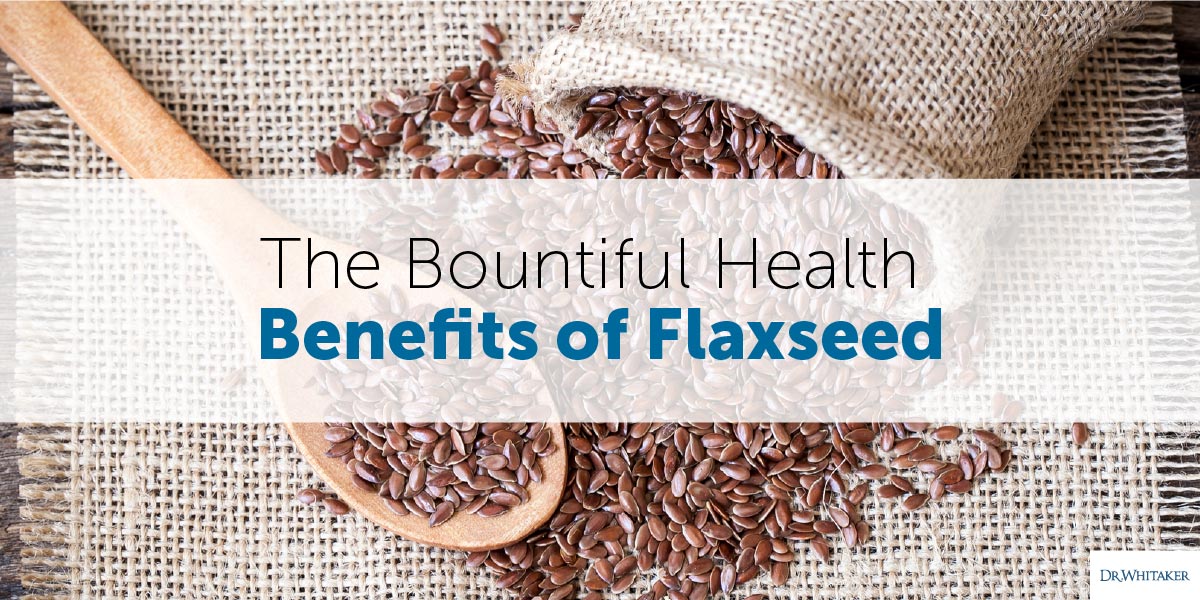
Flaxseed is no one-trick pony. These tiny, nutty-flavored wonders, also known as linseeds, are nutritional powerhouses loaded with fiber, healthy fats, lignans, and other protective compounds that account for many of the health benefits of flax.
As its botanical name suggests, Linum usitatissimum, is a versatile and valuable plant. (Usitatissimum means most useful.) The cultivation of flax dates back at least 9,000 years. Flax fibers were woven into linen, the cloth that swaddled mummies in Egyptian tombs, and used to make twine, rope, and paper. Flax oil was an ingredient in soap and paint, the blue flowers of the plant were rumored to ward off sorcery and evil doings, and the seeds were eaten to improve gastrointestinal health.
Flax has certainly withstood the test of time. Linen remains a popular fabric, flax oil (also called linseed oil) has a number of industrial applications, and additional medicinal benefits continue to be discovered.
Flaxseed Is Rich in Fiber
One of the most impressive health benefits of flax is that it is an excellent source of both insoluble and soluble fiber. Insoluble fiber, or “roughage,” bulks up the stool and helps it pass through the intestinal tract, preventing constipation and other gastrointestinal complications.
Soluble fiber has even more benefits. It fills you up, which promotes satiety, and helps with weight control. It also delays the emptying of the stomach, allowing glucose to be released more slowly and keeping blood sugar on an even keel. This is not only valuable for anyone who has diabetes, but also for those with weight problems, since spikes and plummets in blood sugar levels can lead to intense food cravings.
Flaxseed Helps Lower Cholesterol
All that fiber leads to another noteworthy health benefit of flax: its ability to lower cholesterol naturally. In a landmark study, researchers in Rome studied the effects of flaxseed on a group of patients with total cholesterol greater than 240. They were randomly assigned to one of three groups: a low-fat diet, a low-fat diet plus a statin drug, and a low-fat diet plus 20 g (about 1/8 cup) of ground flaxseed daily. Cholesterol and triglycerides were measured at the start of the study and after two months of treatment.
The flaxseed group saw their total cholesterol levels plummet by 17.2 percent, their triglycerides by 36.3 percent, and their total cholesterol/HDL cholesterol ratios by 33.5 percent. The big news here is that these results were not statistically different from the statin group. What does this mean? In this study, flax worked just as well as statins in lowering cholesterol! And any time a natural supplement works better than a dangerous prescription drug, I’m all for it.
Great Source of Omega-3s and Lignans
The oils in flax are the most abundant plant source of alpha-linolenic acid, an omega-3 essential fatty acid (EFA). It is converted into DHA and EPA (the same fatty acids found in fish oil), which improve cognitive function, reduce inflammation, and boost overall health.
Yet another health benefit of flaxseed is that it’s nature’s richest source of plant lignans. Lignans are classified as phytoestrogens because they are transformed by bacteria in the intestines into compounds that bind to estrogen receptor sites throughout the body and exert weak estrogenic activity. In one study of menopausal women who were plagued with hot flashes (at least five a day), taking 40 g (a little less than 1/4 cup) of flaxseed daily reduced the frequency of hot flashes by more than one-third.
Equally important, flax’s phytoestrogens block more potent forms of estrogen. This not only helps keep hormone levels balanced, but it also does one other very important thing: It protects against certain types of cancer.
Protection Against Certain Cancers
The “C” word is scary for everyone, which makes this health benefit of flaxseed an important one. The lignans in flax are protective against certain types of cancers. One type is breast cancer. New York researchers looked at the dietary lignan intake of more than 3,000 women in relation to breast cancer risk. After adjustments were made for age and other relevant factors, they determined that premenopausal women who consumed the highest amounts of lignans had a reduced risk of breast cancer.
Another is prostate cancer. Swedish researchers recently found that eating foods rich in phytoestrogens and lignans, such as flaxseeds and soybeans, is associated with a lower risk of prostate cancer.
Flaxseed also appears to reduce tumor growth in women with existing breast cancer. A Toronto research team gave participants with newly diagnosed breast cancer a muffin containing 25 g of flaxseed every day for about a month, while another group of women were given muffins without flax. In the group eating flaxseed, tumor proliferation was reduced by an average of 34.2 percent, and a 30.7 percent increase in apoptosis (cell death) in cancer cells was observed.
How to Reap the Many Health Benefits of Flaxseed
It’s easy to see why flaxseed is a part of my general recommendations for good health. To reap the health benefits of flaxseed, incorporate about 1/4 cup (50 g) of freshly ground flax into your daily diet. To grind, place whole flaxseeds into a coffee grinder, food processor, or blender and process for about five seconds. Sprinkle on yogurt, fruit, oatmeal, salads, and other foods; or try my favorite flaxseed smoothie recipe:
In a blender, place 1/4 cup freshly ground flaxseed, 3/4 cup of water, 1 cup of ice cubes, 1 1/2 cups of fruit* (I prefer blueberries and strawberries), and 2 scoops of protein powder. Blend well and serve immediately. For variation, add plain, nonfat Greek yogurt or a scoop of greens. (Serves 2.)
*If you use frozen fruit, use less ice and more water.


